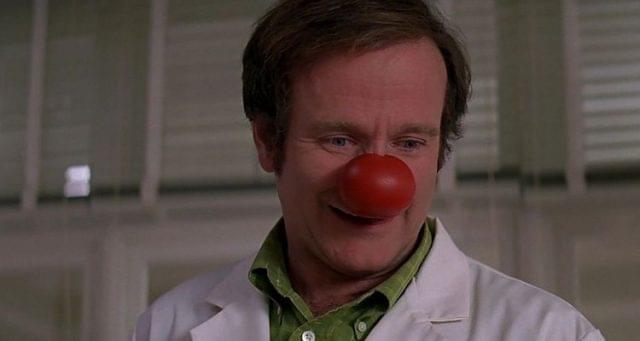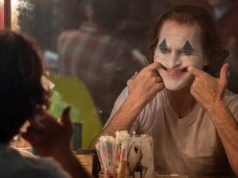
In a good movie, the hero faces difficulties that the audience can recognize and identify with, and he overcomes them through his own strength and tenacity. That’s in a good movie. In a bad movie — say, “Patch Adams,” to choose one example purely at random — the hero faces obstacles that are contrived and fake and bear no resemblance to real life but that give him the opportunity to show how awesome he is in defeating them.
Smart audiences see through the ruse. They say, “Why should I feel inspired by this idiot’s ability to overcome phony obstacles? This movie is trying to manipulate me!” Dumb audiences fall for it. They say, “‘Patch Adams’ made me cry! Robin Williams is so funny! I believe ‘Two and a Half Men’ is the wittiest show on TV, and that the most authentic Italian food in America can be found at Olive Garden! I am entertained by anything that is bland, inoffensive, and formulaic!” (I am paraphrasing the dumb audiences.)
“Patch Adams” is so simple-minded and clumsy that you’d think it was a propaganda film made by the Patch Adams Corporation to convince the public that Patch Adams is the Messiah. He is presented as a character without flaws — or, rather, despite his many obvious flaws, the movie tries to convince us that he is perfect. Replace director Tom Shadyac with Leni Riefenstahl and Patch Adams with Hitler and you’ve got “Triumph of the Will,” only less funny.
Hunter “Patch” Adams, who is a real person, is played in the film by one-time funnyman Robin Williams. (I use the term literally: He was funny one time. It was a Thursday, and it was in 1978.) We begin with a suicidal Hunter Adams checking himself into a mental institution and immediately bringing about transformations in the other patients that the trained staff have been unable to achieve despite months of effort. It turns out all anyone ever needed was some soft wisdom, corny jokes, and the fake-humble smile that Robin Williams does that makes me want to never stop slapping him. Why, if they’d only known that before, they could have fired all the doctors and tossed the medications!
It’s while he’s in the nuthouse that Hunter adopts the nickname Patch and decides he wants to be a doctor. After all, he’s a natural at helping people, and doing it makes him happy. And who better to entrust your medical care to than a man who became a doctor on a whim after trying to kill himself?
We skip ahead two years. Now he’s entering medical school and running afoul of everyone he meets. This is because everyone he meets is set up to be prickly, dour, and conservative, all the better to delight us when Patch takes ’em down a peg or two. For example, when he meets his roommate, a serious student named Mitch (Philip Seymour Hoffman), the first thing out of Mitch’s mouth is that he won a scientific achievement award when he was an undergrad. He mentions this apropos of nothing, even though no real person would do so. And why does he do it? So we’ll know instantly that he is a stick-in-the-mud, and so that Patch Adams can deflate his pomposity with a joke about how he, Patch, won a prize for a drawing he made in third grade, or something. See? Patch Adams is down-to-earth and normal! Not like all those stuffed shirts around him!
Another person who doesn’t like Patch (besides me) is the crusty old Dean Walcott (Bob Gunton). He states his mission on the very first day: “We’re going to train the humanity out of you and make you into something better! We’re going to make doctors out of you!” Everyone except Patch thinks this is a great idea. But Patch insists doctors should be humane and nice and interested in people as individuals. The movie wants you to think Patch’s philosophy is revolutionary, conveniently overlooking the fact that it isn’t. Patch is setting out to solve a problem that doesn’t actually exist.
Though medical students aren’t supposed to interact with patients at the hospital until their third year, Patch starts doing so immediately. He doesn’t give diagnoses or dispense medicine, of course; he simply clowns around like a jackass and makes cancer kids laugh. The fact that they are entertained by Patch — whose jokes all sound suspiciously like Robin Williams’ carefully planned “ad libs” — is evidence of their deteriorating mental faculties.
But you’re not supposed to make people laugh! says the crusty old dean. (Boo! He’s the villain! BOOO!)
I’m just trying to treat people like human beings! Patch says. (Yay! Our hero! He’s so wise! I WANT TO LICK HIM!!)
As you watch the film (which I am not suggesting you should do), you might occasionally wonder whether a particular character’s opinions are right or wrong. The movie has made it easy to keep track, however. Simply ask yourself this: Is the character in question named Patch Adams? If yes, then the character is right. If no, then the character is wrong. The only way a person who is not Patch Adams can ever be right is if that person says something that Patch Adams agrees with.
You’ll have to remind yourself of this a lot, because otherwise you might think some of Patch’s attitudes and actions are wrong. Like when he operates a medical clinic without a license, for example, or when he steals supplies from the hospital. Just remember: Right or wrong, Patch Adams is always right.
The dean says to Patch, “You don’t necessarily think the rules apply to you.” This is a very astute observation, and it is accurate. But Patch’s response is, “Not all the rules, sir. But the Golden Rule, I think that applies to everyone.”
Yeah, mm-hmm, good point. Except wait, it has nothing to do with what we were talking about. It’s a complete non sequitur. But again, if the movie has outsmarted you, you think, “You tell him, Patch! Take that jerk down a notch!”
Another example of a faux-wise thing that Patch says: “Only human beings kill their own species.” Which would be very thought-provoking if it were, you know, true.
Late in the film, a terrible event happens. A suicidal man kills someone else and himself. It is Patch’s fault, because he was using his own whimsical method of healthcare — i.e., rubber noses and stupid jokes — to treat a man who clearly needed to see a real psychiatrist and obtain real medication. Patch feels guilty for approximately three seconds and considers abandoning his life’s work. Fortunately, this crisis of faith is resolved when everyone — including his sullen roommate Mitch — tells him how great he is. Whew! Crisis averted!
Here is a partial list of problems in this movie that Patch solves simply by bein’ Patch:
– A man dying of pancreatic cancer who has been grumpy and mean to the nurses warms up to Patch — so much that in his final moments on earth, he prefers to have Patch by his side rather than his own wife and children.
– A fellow student named Carin (Monica Potter) was sexually abused as a child and has hated men ever since — until she meets Patch, that is!
– A crazy guy refuses to leave his bed because of invisible squirrels. Patch cures him by pretending to shoot the squirrels with invisible guns. Done and done!
– Mitch thought to be a doctor meant studying really hard and learning as much as possible about the human body. Patch showed him that it’s actually more important to call patients by their first names and smile when you talk to them. Take that, Hippocrates!
– All of mankind is doomed by nature to eventually grow old and die. Patch uses his powers of mirth to reverse this process and grant everyone immortality. Suck it, Death!
Just kidding on the last one, though it’s not very far-fetched considering how highly the film esteems Patch Adams. Everything he says to everyone else is fodder for deep thought and contemplation, while everything that everyone says to him — particular if it is meant to correct or reprimand him — is foolish and easily dismissed.
Real people — and, I might add, realistic movie characters — suffer setbacks, but not our Patch. He merely endures a few brief moments where it looks like he might have suffered a setback before he discovers that there was no setback after all. Real people also learn and grow and develop and change, but not our Patch. Patch is already a faultless, sainted being when the movie starts. What, would you seek to improve upon perfection?! Blasphemy! He is Patch Adams, mighty savior of all mankind! BOW DOWN BEFORE HIM!
— Film.com





